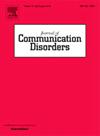Assessing mental health of people with complex communication needs: A systematic review.
IF 2.1
3区 医学
Q2 AUDIOLOGY & SPEECH-LANGUAGE PATHOLOGY
引用次数: 0
Abstract
Mental health is “a state of wellbeing” as per the World Health Organisation. People with disabilities generally experience poorer wellbeing than those without disabilities. Instruments which assess wellbeing or its three core components (emotional, psychological, social) may be less accessible or appropriate for people with complex communication needs (CCN). This study aimed to identify and describe instruments used to measure wellbeing in people with CCN. A systematic review following PRISMA guidelines was conducted. Six databases were searched to identify studies where wellbeing was measured in people with CCN. Two reviewers extracted data to describe the studies, participants, instrument(s) used, and adaptations applied. Instrument items were then mapped to indicators of mental health. Twenty-six studies were included. Participants’ receptive language ranged normal to profoundly impaired and they used a variety of expressive communication methods. Twenty-two different instruments were identified; ten of which were quality-of-life measures. Adaptations were made to instruments in eight studies, mostly to administration procedures. Item mapping revealed that while some wellbeing indicators were represented within the included instruments, coverage was insufficient to consider any instrument a “measure of wellbeing” for this population. Some instruments had features which made them more appropriate for people with CCN: ensuring communication access; recognising the relative importance of wellbeing indicators to an individual; collecting information from multiple sources when using proxy-report; and acknowledging environmental factors. Research is required to develop or adapt an instrument for valid and reliable measurement of wellbeing in people with CCN, ensuring the instrument addresses their communication access needs.
评估有复杂沟通需求的人的心理健康:一项系统综述。
根据世界卫生组织的定义,心理健康是“一种健康状态”。残疾人的幸福感通常不如非残疾人。评估幸福感或其三个核心组成部分(情感、心理、社会)的工具可能不太容易获得,也不太适合具有复杂沟通需求(CCN)的人。本研究旨在确定和描述用于衡量CCN患者幸福感的工具。根据PRISMA指南进行了系统审查。研究人员搜索了六个数据库,以确定对患有CCN的人进行幸福感测量的研究。两位审稿人提取数据来描述研究、参与者、使用的工具和应用的适应性。然后将工具项目映射为心理健康指标。纳入了26项研究。参与者的接受性语言范围从正常到严重受损,他们使用各种表达性沟通方法。确定了22种不同的乐器;其中10项是生活质量指标。在8项研究中对仪器进行了调整,主要是对管理程序进行了调整。项目图显示,虽然在所包括的工具中代表了一些幸福指标,但覆盖率不足以将任何工具视为该人口的“幸福指标”。有些工具具有使其更适合CCN患者的特点:确保通信通道;认识到幸福指标对个人的相对重要性;使用proxy-report时,从多个来源收集信息;承认环境因素。需要进行研究,开发或调整一种工具,以有效和可靠地测量CCN患者的福祉,确保该工具满足他们的通信获取需求。
本文章由计算机程序翻译,如有差异,请以英文原文为准。
求助全文
约1分钟内获得全文
求助全文
来源期刊

Journal of Communication Disorders
AUDIOLOGY & SPEECH-LANGUAGE PATHOLOGY-REHABILITATION
CiteScore
3.30
自引率
5.90%
发文量
71
审稿时长
>12 weeks
期刊介绍:
The Journal of Communication Disorders publishes original articles on topics related to disorders of speech, language and hearing. Authors are encouraged to submit reports of experimental or descriptive investigations (research articles), review articles, tutorials or discussion papers, or letters to the editor ("short communications"). Please note that we do not accept case studies unless they conform to the principles of single-subject experimental design. Special issues are published periodically on timely and clinically relevant topics.
 求助内容:
求助内容: 应助结果提醒方式:
应助结果提醒方式:


